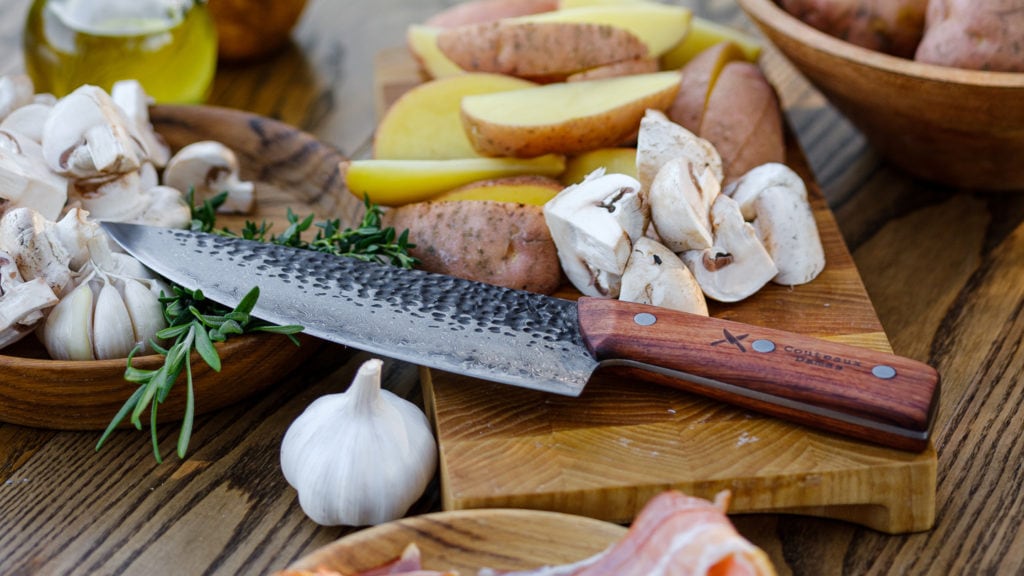In the world of culinary arts, knife selection is paramount for proficiency and efficiency. Among the myriad available options, the lightweight Damascus kitchen knife stands out, especially for kitchen professionals who value precision and quality. Understanding its unique features, historical significance, and practical advantages over other knives can make a huge difference in your culinary prowess.
Renowned for its exceptional durability and sharpness, a lightweight Damascus kitchen knife is a staple in professional kitchens. Its alluring patterns, forged into the steel, not only make it aesthetically pleasing but also enhance its resilience. Those interested in the detailed history of Damascus steel can check out this in-depth resource from Cris Ploof.

Understanding Damascus Steel
Damascus steel has a storied history. With origins dating back to ancient times, it was revered for its unrivaled combination of strength and flexibility. This steel was traditionally produced by repeatedly folding iron and steel together, creating natural patterns. The technique has evolved but continues to inspire modern knife artisans, preserving its legacy. For those wanting a more detailed dive into its history, the fascinating journey of this material is documented in an article from the Swords of Northshire.
Key Features That Define a Lightweight Damascus Kitchen Knife
The hallmark of a lightweight Damascus kitchen knife is its harmonious blend of functionality and artistry. These knives are distinguished by:
1. Superior Sharpness
The blades are razor-sharp, making them impeccable for cutting, slicing, and dicing tasks. They are particularly beloved by professionals who demand precision.
2. Enhanced Durability
Damascus steel is renowned for its long-lasting edge retention, which minimizes the necessity for frequent sharpening. This feature ensures that chefs can rely on their knives for prolonged use without sacrificing performance.
3. Lightweight Nature
Despite its robust construction, these knives remain lightweight. This characteristic reduces fatigue, especially during extensive kitchen hours, making it a preferred choice for culinary experts.
The Practical Advantages in the Kitchen
Beyond aesthetics, the lightweight Damascus kitchen knife offers unparalleled advantages that cater to the diverse needs of kitchen professionals:
Environmentally Sustainable
The careful craftsmanship ensures minimal waste during production. This thoughtfulness aligns with today's growing trend of sustainability in professional kitchens.
Versatile Design
With a range of available blade shapes and sizes, these knives adapt to different culinary techniques. Whether you're filleting a fish or chopping vegetables, there's a Damascus knife suited to the task.
Incorporating Damascus Knives in Your Collection
For chefs looking to expand their knife collection with a reliable piece, considering a lightweight Damascus kitchen knife is a wise choice. Their alluring design and functional prowess add value to any culinary toolkit. If price is a concern, there are numerous budget-friendly Damascus knives options available that don't compromise on quality.
Maintenance Tips for Longevity
To maintain the knife's performance and prolong its life, follow these simple care tips:
- Always hand wash and dry the knife after use to prevent rust.
- Store it in a protective sheath or knife block to safeguard the edge.
- Regularly hone the edge with a sharpening steel to keep it sharp.
For more information on understanding and maintaining Damascus knives, consider reading about the History and Care of these remarkable tools.

Faq
Q: Why choose a Damascus knife over others?
A: With superior sharpness, durability, and a unique design, Damascus knives are an excellent choice for any professional kitchen.
Q: Are Damascus knives available in different styles?
A: Yes, they come in various styles and sizes, making them highly versatile for different culinary needs.
Q: What is the best way to maintain a Damascus knife?
A: Hand wash, dry immediately, and sharpen regularly. Store it properly to maintain the knife's lifespan and performance.
This article contains affiliate links. We may earn a commission at no extra cost to you.


























